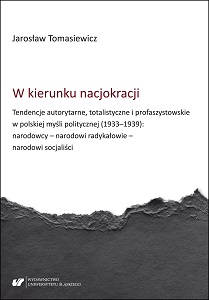W kierunku nacjokracji. Tendencje autorytarne, totalistyczne i profaszystowskie w polskiej myśli politycznej (1933–1939): narodowcy – narodowi radykałowie – narodowi socjaliści
Toward nation-cracy. Authoritarian, totalitarian, and pro-fascist tendencies in the Polish political thought (1933‒1939) Nationalists – national radicals – national socialists
Author(s): Jarosław Tomasiewicz
Subject(s): History, Political history
Published by: Wydawnictwo Uniwersytetu Śląskiego
Summary/Abstract: The 1930s were a time of triumphant totalitarianism. The Great Depression yielded disillusionment with democratic-liberal status quo and its critics were, in turn, invigorated by the examples of totalitarian states. Another phenomenon that appeared then consisted in the extremisms mutually propelling each other: political victories achieved by fascism prompted its opponents to embrace communism, and vice versa. Poland, having been squeezed between Hitler’s Third Reich and Stalin’s USSR, did not manage to escape those tendencies. Thus, it was only natural for the fascination with fascism to, first and foremost, have occurred in the broadly understood nationalist camp, whose supporters aimed at the nation-cracy, that is, securing political monopoly for the ethnic Poles. The conception perceiving national unity as one body (organic unity) entailed it to be hierarchically organized, which translated into authoritarian or even totalitarian structure of state organization. However, the evolution of nationalist political camp toward totalitarianism was marked by some reservations and inconsistency. In mainstream politics, totalitarian tendencies failed to gain momentum, for the National Party stopped halfway through. The party’s “youth”, who were dominant during that time, embarked on elaboration of “the third way”: in the sphere of values – Christianized “poly-nationalism” somewhere between national chauvinism and cosmopolitanism, in the sphere of economy – a state-regulated distributionism, between laissezfaireism and statism, and in terms of political system – a hierarchical organization between democratic liberalism and totalitarianism. Such was the ideology of the National Radical Camp ABC’s splitters. An entirely totalitarian agenda, in turn, had been drawn up by another faction of radically nationalist secessionists, namely the Falanga National Radical Movement (RNR-Falanga). The said political programme was designed as “totalitarian democracy” of sorts, which boiled down to a utopian attempt at identifying nation state with its people in accordance with the “organic unity” model: building the national consciousness of Poles was supposed to instigate a social movement which would outgrow the state structures. The said process would have been accompanied by an overall socio-economic overhaul introducing social homogeneity by totally subjugating economy to the state. Yet another group of splitters, namely the state-nationalist current, came up with similar conclusions. However, their links to the ruling Sanacja caused their more pronounced support for the top-down coercion, while remaining more conservative when it comes to social matters.The current which split from national camp prior to the First World War was the national workers’ movement. During the 1930s the National Socialists’ Party (PNS) emerged. Due to its prodemocracy programme, the said party was more akin to the national socialists of Czechoslovakia than Hitler’s ideology. Aside from PNS there were also other national socialist groups, which openly followed into NSDAP footsteps. Yet, national socialism operated at the margins of the Polish political scene, having no considerable impact on it.At the risk of some generalization, one may claim that fascism did not fall on fertile ground in Poland: the closer a given political group was to the totalitarian model, the less significant it appeared on the political scene. One may even claim that the significance was inversely proportional to the degree of radicalism. Although there occurred a quite broad interest in fascism, there were few orthodox fascists in Poland. Even sympathizers of fascist ideas observed them in their peculiar Polish way, distancing themselves from the movement’s negative aspects. It could be suspected that the weak embeddedness of fascism in Poland had two causes. The first one was individualistic and liberty-loving Polish mentality and political culture, going back to the times of the Polish-Lithuanian Commonwealth and only reaffirmed during the partitions. The second one was Poland’s civilizational underdevelopment, the result of which was insufficient state apparatus and infrastructure to implement the totalitarian model.
Series: Nauki społeczne
- E-ISBN-13: 978-83-226-3357-1
- Print-ISBN-13: 978-83-226-3356-4
- Page Count: 412
- Publication Year: 2019
- Language: Polish
- eBook-PDF
- Table of Content
- Introduction

